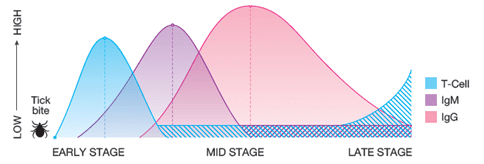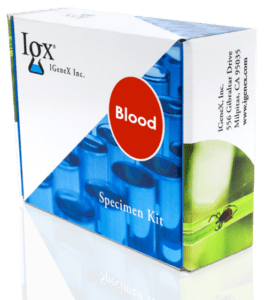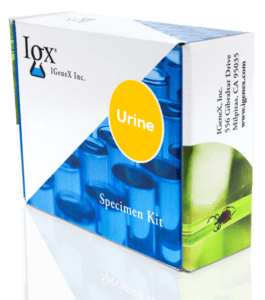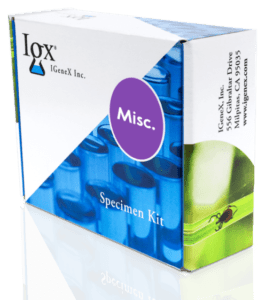Getting accurate test results is the first step in getting treatment for Lyme disease. Still, it can be difficult to navigate the world of testing and understand how different tests work. We’re here to help clear up some of the confusion, specifically when it comes to different types of cells and antibodies.
T Cells, B Cells, and Your Immune System
Your immune system is a complex network of cells, chemicals, and organs that work together to help fight off harmful microorganisms like viruses or bacteria, known as pathogens. Antigens are proteins that are found on the surface of pathogens.
When your immune system doesn’t recognize a certain substance, the antigens on the pathogen cause your immune system cells to produce antibodies to fight it off. This is called an immune response.
The immune system is composed of two main types of Lymphocytes, or white blood cells: T cells and B cells. T cells and B cells work together to recognize antigens, or foreign substances. Together they are responsible for your adaptive immunity.
B cells are responsible for making antibodies that can destroy foreign substances. There are two different types of T cells, however. Helper T-cells stimulate B-cells to make antibodies, and help develop the other types of T-cells – Killer T-cells. These Killer T-cells kill cells that have been infected by a foreign pathogen.
During an immune response to a foreign antigen, B cells begin to secrete antibodies. The first antibodies it secretes are called IgM (Immunoglobulin M). After more exposure to the antigen, B-cells then begin to produce IgG antibodies (Immunoglobulin G).
Which test to choose based on T-cell and antibody response?

IgG vs. IgM Antibodies
So what’s the difference between these two types of antibodies? For one, their size. IgG antibodies are smaller than IgM antibodies. IgG antibodies make up the majority of immunoglobulins in the blood (70-89%), while IgM account for about 15%.
Like we mentioned before, another main difference is that IgM antibodies are the first line of defense that B-cells create, while IgG antibodies are secreted after prolonged exposure to a harmful pathogen. IgG antibodies form the basis for long-term protection against specific pathogens, like the bacteria that can cause Lyme disease.

Antibodies and Lyme Disease Testing
Remember that IgM antibodies appear early on as a response to an infection, but levels typically decline over time. Because of this, tests that rely on the detection of IgM antibodies, like the Lyme IgM Antibody Serology, may only be positive for two to six weeks after exposure.
Other tests like the Lyme Broad Coverage Ab Assay, Lyme ImmunoBlot, and Lyme Western Blot detect multiple types of antibodies (like IgG) and may able to detect Lyme disease in the case of later re-activation of infection.
Tests that depend on the detection of antibodies, specifically IgM antibodies, are time sensitive, and typically only have a small window which they can be used after exposure to a tick. Luckily there are other tests available for people who are in the late stages or have Chronic Lyme disease. These tests include the Lyme Multiplex PCR, Lyme Western Blot IgM, and the Lyme Dot-Blot Assay (LDA).

Finding The Right Lyme Disease Test
Symptoms of Lyme disease can mimic a wide range of illnesses, which can cause tick-borne infections to go misdiagnosed for long periods of time. Laboratory testing is vital for confirming a diagnosis so that people can get the treatment that they need.
However, it can be difficult to find the testing and care you need after potential infection of Lyme disease. Not all Lyme testing is created equal. For example, the CDC-recommended two-tiered testing (TTT) is notoriously unreliable, as many commercially available tests are not always sensitive enough to detect active infections.
IGeneX tests, on the other hand, provide higher sensitivity testing to detect the bacteria that causes Lyme and other tick-borne diseases. IGeneX test panels contain tests designed to detect IgM or IgG antibodies, meaning they can detect disease at multiple stages.
Learn more about testing with IGeneX today.








